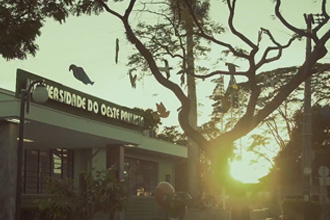Graduate Program in Environment and Regional Development
INTRODUCTION
The Graduate Program in Environment and Regional Development (GPERD) aims to contribute to the training of a professional with systemic and ethical vision, as well as with multidimensional understanding of the regional development process and domain of conceptual and methodological tools that are considered essential for the assessment of environmental impacts and environmental planning. This profile moves to meet the current needs of reorientation of public policies and strategies for the environmental and social development in the region.
Target Audience: Professionals of Life Sciences, Health Science. Earth Sciences, Humanities, Exact Sciences and Applied Sciences.
Area of concentration: Environmental Sciences

RESEARCH LINES
ASSESSMENT AND ANALYSIS OF ENVIRONMENTAL IMPACT
Overview: This research line aims to conduct studies and research related to the analysis of environmental impacts caused by predominantly anthropogenic factors, considering different aspects of the ecosystem and social impacts. It also emphasizes the investigation of ecological, geological, geomorphological and climatological processes related to environmental problems and to the development of explanatory models for the mechanistic understanding of the environmental impacts.
Related Faculty:
- Alba Regina Azevedo Arana(alba@unoeste.br)
- Ana Paula Alves Favareto (anafavareto@unoeste.br)
- Ana Paula Marques Ramos (anaramos@unoeste.br
- Ângela Mitie Otta Kinoshita (angela@unoeste.br
- Daniela Vanessa Moris (danimoris@gmail.com
- Edson Assunção Mareco (edson@unoeste.br
- Hamilton Mitsugu Ishiki (hamilton@unoeste.br
- Luiz Euribel Prestes Carneiro (luiz@unoeste.br
- Maíra Rodrigues Uliana (maira@unoeste.br
- Marcelo Rodrigo Alves (marceloalves@unoeste.br
- Marcus Vinícius Pimenta Rodrigues (marcusvinicius@unoeste.br
- Paulo Antonio da Silva (pauloantonio@unoeste.br
- Renata Calciolari Rossi e Silva (renatacalciolari@terra.com.br
- Rogério Giuffrida (rgiuffrida@unoeste.br
- Silas Silva Santos (silas@unoeste.br)
ENVIRONMENTAL PLANNING AND REGIONAL DEVELOPMENT
Overview: This research line aims to develop studies on the following themes: the analysis of environmental public policies targeting to regional development; the development of environmental management strategies; the characterization of ecosystems and environmental planning; management strategies and environmental conservation. These studies intend to analyze the impact of knowledge and information management in the environmental planning and regional development, as well as in the economic and social development and its environmental issues.
Related Faculty:
- Alba Regina Azevedo Arana(alba@unoeste.br)
- Ana Paula Marques Ramos (anaramos@unoeste.br
- Edson Assunção Mareco (edson@unoeste.br
- Maíra Rodrigues Uliana (maira@unoeste.br
- Marcelo Rodrigo Alves (marceloalves@unoeste.br
- Marcus Vinícius Pimenta Rodrigues (marcusvinicius@unoeste.br
- Paulo Antonio da Silva (pauloantonio@unoeste.br
- Rogério Giuffrida (rgiuffrida@unoeste.br
- Silas Silva Santos (silas@unoeste.br)
FACULTY´S EMAIL AND RÉSUMÉ
- Alba Regina Azevedo Arana(alba@unoeste.br)
- Ana Paula Alves Favareto (anafavareto@unoeste.br)
- Ana Paula Marques Ramos (anaramos@unoeste.br
- Ângela Mitie Otta Kinoshita (angela@unoeste.br
- Daniela Vanessa Moris (danimoris@gmail.com
- Edson Assunção Mareco (edson@unoeste.br
- Hamilton Mitsugu Ishiki (hamilton@unoeste.br
- Luiz Euribel Prestes Carneiro (luiz@unoeste.br
- Maíra Rodrigues Uliana (maira@unoeste.br
- Marcelo Rodrigo Alves (marceloalves@unoeste.br
- Marcus Vinícius Pimenta Rodrigues (marcusvinicius@unoeste.br
- Paulo Antonio da Silva (pauloantonio@unoeste.br
- Renata Calciolari Rossi e Silva (renatacalciolari@terra.com.br
- Rogério Giuffrida (rgiuffrida@unoeste.br
- Silas Silva Santos (silas@unoeste.br)
CURRICULAR STRUCTURE AND COURSES
The Graduate Program in Environment and Regional Development has a Curricular Structure with a workload of 1,470 hours (98 credits) distributed in thematic axes of studies with compulsory and elective courses, plan of activities, complementary activities, research activities, general qualification examination, and the development and presentation of Master dissertation, distributed as follows: Compulsory Courses: 14 credits (4 courses); Elective Courses: 16 credits (4 courses); General Qualification Examination: 10 credits; Master dissertation: 30 credits; Complementary Activities: 28 credits.
Compulsory Courses:
Research Methodology:> an Interdisciplinary Dialogue (4 credits)
Special Topics in Environment and Regional Development (2 credits)
Principles of the Natural Environment Organization (4 credits)
Society, Nature and Culture (4 credits)
Elective Courses:
First semester (from March to June)
Line 1 - Assessment and Analysis of Environmental Impact
Applied Environmental Health (4credits)
Topics of Applied Statistics (4 credits)
Wastewater Treatment (4 credits)
Line 2 - Environmental Planning and Regional Development
Environment and Solidarity Economy (4 credits)
Geoprocessing in Environmental Applications (4 credits)
Legislation and Analysis of Environmental Impact (4 credits)
Second semester (from August to November)
Line 1 - Assessment and Analysis of Environmental Impact
Interactions Parasite Host Environment (4credits)
Environmental Chemistry (4credits)
Computational Chemistry (4 credits)
Wasteand Environmental Pollution (4 credits)
Environmental Toxicology (4credits)
Theory of Complex Systems (4 credits)
Line 2 - Environmental Planning and Regional Development
Health, Environment and Regional Development (4 credits)
Sustainable Development and Environmental Planning (4credits)
Geosciences Applied to Environmental Planning: Use of Remote Sensing (4 credits)
Environmental Public Policies and Waste Management (4 credits)
Agrarian Issues and Territorial Development (4 credits)
Sugar Mills and Distilleries of Bioethanol and its Interactions with the Environment (4 credits)
ADMISSIONS
Candidates may submit an application or fill out a prospective form online for further contact from the University.
MAIN RESEARCH PROJECTS
Interdisciplinary Projects:
PROINTER – Waste and its potential impacts in the PONTAL DO PARANAPANEMA region: agroenergy, health, environment and public policies.
Institutional curricular greening: Challenges and perspectives at UNOESTE
POST DOCTORAL POSITIONS
The Graduate Program in Environment and Regional Development receives Ph.D. professionals for postdoctoral internships. Applications should include a proposal containing: a pre-research project, a personal statement describing the applicant’s interest in the environmental and regional development studies and career goals and a letter of recommendation from the researcher’s primary faculty advisor. The application should also indicate who would be the researcher’s program advisor, who must be a member of the program faculty.
Please submit your application or proposal to the addresses listed at the "CONTACT US" section.
VISITOR INFORMATION AND STUDENT LIFE
Founded in 1972, the University of Western São Paulo – UNOESTE is committed to building character, modeling values, and ensuring that students graduate with not only hands-on experience in their field of study, but also with the necessary life skills to be successful.
Rooted in the major areas of knowledge, UNOESTE is a private comprehensive institution with around 18,000 undergraduate and graduate students. Its mission is to provide educational experiences that enlighten, challenge, and prepare students to lead lives of significance in complex global communities, being recognized for the excellence of its academic programs, the depth of its values-based culture, and the breadth of its inclusiveness.
The city of Presidente Prudente is located in the western region of São Paulo State, and is recognized as presenting one of the highest HDI values in Brazil. In this city, every citizen receives extraordinary opportunities for high level education in an inspiring environment.
Although it is a modern and cosmopolitan city, it still maintains many aspects of a small inner city, where people are welcoming, willing to dialogue and mutual understanding, under excellent levels of public safety. In addition, the city has a recognized high cultural level, with theaters, cinemas, artistic and musical presentations, as well as excellent facilities for daily activities, such as an efficient transportation system, and a wide availability of department stores, shopping malls, recreational clubs, gardens and public parks.
Our responsibility is to help prepare students with the knowledge of how to live at the highest of their potential. As a member of our university community, we want you to know that we are committed to making your experience the best it can be.
CONTACT US
For more information, please contact:
International Cooperation Office (ICO)
Email: iaa@unoeste.br
Tel: +55 18 3229-3288
Fax: +55 18 3229-2080
Secretary- Graduate Program in Environment and Regional Development
E-mail: mmadre@unoeste.br or joyce@unoeste.br
Tel: +55 18 3229-3264
Tel: +55 18 3229-2000 Internal extension: 2132
At.
Dean of Research and Graduate Studies
University of Western São Paulo – UNOESTE - Campus II
Rodovia Raposo Tavares, km 572
CEP 19.067-175 Presidente Prudente (SP)
BRAZIL








